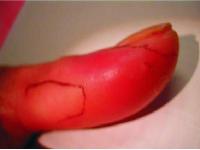Rat-bite fever is often not reported. The bite marks are small and they heal quickly. The diagnosis is therefore often made either too late, or nor at all. Possibly the numbers for the past years do not indicate the occurrence of the disease reliably. Most rat bites are not reported and an infection does not have to lead to serious symptoms. Nevertheless, it is clear that the number of bites has increased over the past years. This probably has to do with the increased popularity of the rat as a pet. It therefore remains important for all people who are often in direct contact with rats to keep in mind that symptoms of disease can be caused by a rat bite or by a damaging of the skin on the cage.
In the case of a bite of scratch the wound needs to be cleaned extensively and disinfected. This also applies to wounds caused by scratching the skin on the bars of the cage. It is also advised to get a tetanus shot from the general practitioner.
Luckily rats hardly ever bite. Like cats and dogs, they only bite under particular circumstances. They defend themselves and their territory (cage) when they feel threatened. They can bite out of self-defense, fear, pain or from startling. A number of tips to prevent rat bites:
- Make sure that your hands do not smell of food, so that the rat doesn’t mistake your hands for a snack.
- Do not tease rats with food and do not feed them through the bars of their cage.
- Teach the rat to take food of your hands carefully by always saying the same thing, such as ‘take carefully’, when you give the rat something.
- Never let visitors stick their fingers through the bars. Warn them against this.
- Be careful when there is a nest. The mother rat can bite to protect her young.
- Be careful with rats that have been startled, that are aggressive or in pain.
- Always pick up a rat carefully and not in a rush. Talk to them first, so you are sure that it has heard you and is expecting your picking it up.
Rat-bite fever
14juli2010
A Dutch rapport from 2009 notes that on average 2% of rat bites lead to an infection with Streptobacillus moniliformis. S. moniliformis is a common airway bacterium in rodents. Many rats (wild as well as tame rats) are infected with this bacterium.
